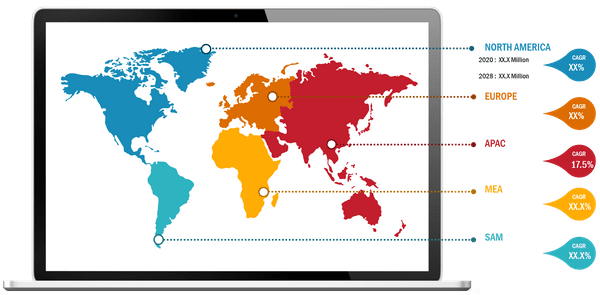The global remote patient monitoring market, based on type, is segmented into software, devices, and services. In 2020, the devices segment accounted for the largest share in the market and is expected to retain its dominance during the forecast years. The market growth for this segment is attributed to the high-volume demand for vital sign remote patient monitoring devices across various countries worldwide. In addition, the surge in demand for respiratory and multifunctional monitoring devices due to the COVID-19 outbreak also contributes to the market growth for this segment. Furthermore, medical device manufacturers are constantly focusing on the improvement of the quality and innovations in these devices, which would help the segment to hold a dominant share in the remote patient monitoring market during the forecast years.
Koninklijke Philips N.V., NIHON KOHDEN CORPORATION, Medtronic, General Electric, Cerner Corporation, Siemens Healthineers AG, Boston Scientific Corporation, Omron Healthcare, Abbott, and VitalConnect are among the leading companies operating in the remote patient monitoring market.
Request for sample PDF Copy at: https://www.theinsightpartners.com/sample/TIPRE00022440/
The COVID-19 outbreak has been adversely affecting most of the businesses globally since December 2019. Due to the pandemic, international trade and supply chain are disrupted. However, overall prospects for the growth of the remote patient monitoring market are considered positive. Increasing government support and reimbursement policies for various remote patient monitoring devices to reduce and avoid human contact during the pandemic and promote telehealth and monitoring services have bolstered the growth of remote patient monitoring market.
Healthcare has taken a centerstage in the backdrop of COVID-19 outbreak in terms of its capacity and reach in countries such as India, Australia, South Africa, Saudi Arabia, the UAE, Oman, Qatar, Kuwait, and others. The shortage of hospitals and skilled professionals, along with the risk of unnecessary exposure, has led to the adoption of meaningful remote patient monitoring and management solutions. There has been a significant push by governments of various countries to enable healthcare facilities for the underserved communities and geographies through technology-adopted imperatives. For instance, in April 2020, The Ministry of Health & Family Welfare India (MoHFW) in collaboration with NITI Aayog allowed consultations through multifarious communication channels via audio, video, and text for registered medical practitioners to prescribe medications. The government’s proactive steps for clarification of the regulatory regime surrounding this vital industry has given a booster shot during a critical COVID-19 pandemic. Furthermore, in March 2021, the Australian Government added several temporary Medicare items to help healthcare professionals deliver remote patient monitoring and telehealth services via video conferencing and phone calls. The Australian Health Protection Principal Committee (AHPPC) approved and recommended the policy to continue till December 2021.
According to the American College of Cardiology Foundation, in 2018, CHD was the major cause of death, owing to cardiovascular disease (CVD), followed by stroke, high BP, heart failure, and other CVDs contribution share of 16.8%, 9.4%, 9.0%, and 17.9% respectively. By 2035, nearly 130 million adults in the US are feared to have CVD. Thus, rising geriatric population and related chronic disorders are expected to push the sales of remote patient monitoring devices, thus propelling the growth of global remote patient monitoring devices market during the forecast period.
The rate of obesity among population is growing rapidly in developed as well as developing countries across the world. Unhealthy lifestyle and sedentary life are the factors driving the number of obese individuals. According to the Organization for Economic Co-operation, (OECD), in 2020, more than 1.9 billion adults of 18 years and above were overweight, of these over 650 million were obese. The number has grown rapidly in Canada, Australia, Chile, the UK, and South Africa. Obese population is expected to be high in the US, Mexico, and England, consisting of around 47%, 39% and 35% respectively by next 2 decades.
Diabetes is caused by the body’s inability to secret insulin and is considered a life-threatening disorder with no ensured cure. This inability prevents body from adequately regulating blood glucose levels. Diabetes is one of the largest diseases of the 21st century. According to the International Diabetes Federation (IDF), in 2017, the total number of diabetic populations in North America was 46 million and by 2045, it is expected to rise to 62 million. The increase in number of people suffering from various lifestyle and chronic diseases creates a need for efficient devices and solutions to monitor individual’s physiological parameters, under a physician’s consultation, thereby increasing the demand for remote patient monitoring devices. This is likely to promote the market growth during the forecast years.
Remote Patient Monitoring Market – by Geography
- North America
- US
- Canada
- Mexico
- Europe
- France
- Germany
- Italy
- UK
- Russia
- Rest of Europe
- Asia Pacific (APAC)
- China
- India
- Japan
- Australia
- South Korea
- Rest of Asia Pacific
- Middle East and Africa (MEA)
- South Africa
- Saudi Arabia
- UAE
- Rest of Middle East & Africa
- South and Central America (SCAM)
- Brazil
- Argentina
- Rest of South and Central America
Purchase Full Copy of This Report at: https://www.theinsightpartners.com/buy/TIPRE00022440/
Media Contact
Company Name: The Insight Partners
Contact Person: Sameer Joshi
Email:Send Email
Phone: +1-646-491-9876
City: Pune
State: Maharashtra
Country: India
Website: https://www.theinsightpartners.com

